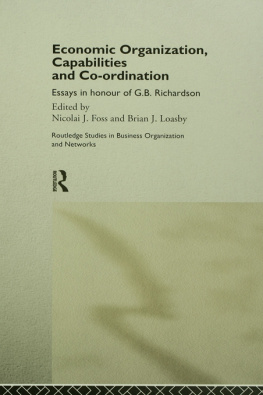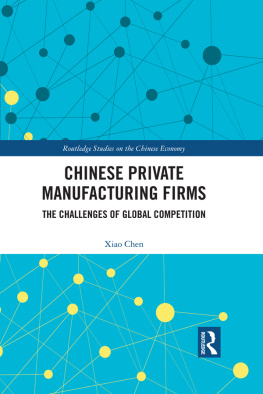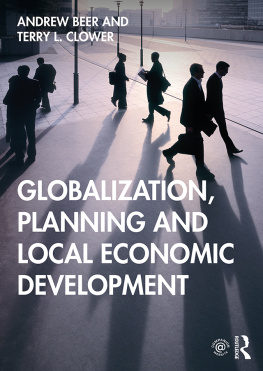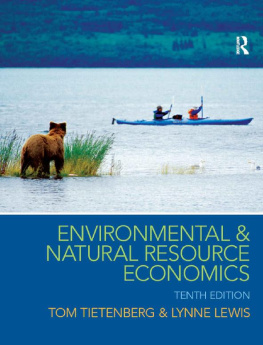
ECONOMIC ORGANIZATION, CAPABILITIES AND CO-ORDINATION
G.B. Richardson is often thought of as one of the founding fathers of the theory of the firm and the market. His work has given insights into key issues and debates such as markets versus hierarchies, the antitrust implications of price agreements, the economics of information and the concept of competition based upon differentiated firms. Yet whilst he is often quoted, few people are familiar with his original work.
Drawn from a recent colloquium held in his honour, the papers in this volume tie in with the themes central in G.B. Richardsons work, addressing their significance, their relationship to the work of other economists and their potential for further development. The first few chapters cover themes related to the comparative neglect of Richardsons work, the links with the Marshallian school and Austrian economics. Later chapters go on to discuss modern thinking on the theory of the firm, connections between economic and management approaches, as well as applications of the Richardson model to collaborative arrangements, the growth of the firm and innovation policy. Crucially, the book also includes a recent essay by G.B. Richardson himself, which clearly shows the continuing development of his ideas.
This collection aims to encourage further development of Richardsons themes. It will make excellent reading for students looking at the capability/competence approach to the firm, and for all those wishing to get to know the work of this important economist.
Nicolai J. Foss is Associate Professor in the Department of Industrial Economics and Strategy at the Copenhagen Business School in Denmark.
Brian J. Loasby is Emeritus Professor in the Department of Economics, University of Stirling.
ROUTLEDGE STUDIES IN BUSINESS ORGANIZATION AND NETWORKS
1. DEMOCRACY AND EFFICIENCY IN THE ECONOMIC ENTERPRISE
Edited by Ugo Pagano and Robert Rowthorn
2. TOWARDS A COMPETENCE THEORY OF THE FIRM
Edited by Nicolai J. Foss and Christian Knudsen
3. UNCERTAINTY AND ECONOMIC EVOLUTION
Essays in Honour of Armen A. Alchian
Edited by John R. Lott Jr.
4. THE END OF THE PROFESSIONS?
The Restructuring of Professional Work
Edited by Jane Broadbent, Michael Bietrick and Jennifer Roberts
5. SHOPFLOOR MATTERS
Labor-management relations in 20th century American manufacturing
David Fairris
6. THE ORGANISATION OF THE FIRM
International Business Perspecives
Edited by Ram Mudambi and Martin Ricketts
7. ORGANIZING INDUSTRIAL ACTIVITIES ACROSS BORDERS
Anna Dubois
8. ECONOMIC ORGANIZATION, CAPABILITIES AND CO-ORDINATION
Edited by Nicolai J. Foss and Brian J. Loasby
ECONOMIC ORGANIZATION, CAPABILITIES AND CO-ORDINATION
Essays in Honour of G. B. Richardson
Edited by Nicolai J. Foss and Brian J. Loasby

First published 1998
by Routledge
11 New Fetter Lane, London EC4P 4EE
Simultaneously published in the USA and Canada
by Routledge
29 West 35th Street, New York, NY 10001
1998 Nicolai J. Foss and Brian J. Loasby, selection and editorial matter; individual chapters, the contributors
Typeset in Garamond by Routledge
Printed and bound in Great Britain by Redwood Books, Trowbridge, Wiltshire
All rights reserved. No part of this book may be reprinted or reproduced or utilised in any form or by any electronic, mechanical, or other means, now known or hereafter invented, including photocopying and recording, or in any information storage or retrieval system, without permission in writing from the publishers.
British Library Cataloguing in Publication Data
A catalogue record for this book is available from the British Library
Library of Congress Cataloging in Publication Data
Economic organization, capabilities and co-ordination/edited by Nicolai J. Foss and Brian J. Loasby.
Drawn from a recent colloquium held in his honour, the papers in this volume tie in with the themes central in G. B. Richardsons work.
Includes bibliographical references and index.
1. Competition Congresses. 2. Investments Congresses. 3. Uncertainty Congresses. 4. Equilibrium (Economics) Congresses. 5. Prices Congresses. 6. Capitalism Congresses. 7. Richardson, G. B. I. Foss, Nicolai, J. II. Loasby, Brian J. III. Richardson, G. B.
HD41.E29 1998
338.5dc21
9739553
CIP
ISBN 0415183901
CONTENTS
ILLUSTRATIONS
Figures
Tables
NOTES ON CONTRIBUTORS
Richard Arena, Dpartement Economie, Universit de Nice-Sophia Antipolis LATAPSES-CNRS.
Mark Casson, Department of Economics, University of Reading.
Claire Charbit, Dpartement Economie, Ecole Nationale Suprieure des Tlcommunications, Paris.
Peter E. Earl, Department of Economics, Lincoln University.
Nicolai J. Foss, Department of Industrial Economics and Strategy, Copenhagen Business School.
Neil M. Kay, Department of Economics, University of Strathclyde.
Richard N. Langlois, Department of Economics, University of Connecticut.
Brian J. Loasby, Department of Economics, University of Stirling.
John Nightingale, Senior Lecturer in Economics, University of New England, NSW.
Denis OBrien, Department of Economics, University of Durham.
Jacques-Laurent Ravix, University of Nice-Sophia Antipolis and LATAPSES-CNRS.
Gavin C. Reid, CRIEFF, University of St Andrews.
George B. Richardson, Oxford.
Paul L. Robertson, Department of Economics and Management, University College, University of New South Wales.
INTRODUCTION
Co-ordination and capabilities
Nicolai J. Foss and Brian J. Loasby
In 1974 George B. Richardson, who had been a Reader at Oxford University and a Fellow of St Johns College, became Chief Executive of Oxford University Press. In doing so he consciously abandoned his career in economics, because of an apparent lack of interest in his work by fellow economists and his own dissatisfaction with the trend of economic thinking. After managing Oxford University Press for fifteen years, he became Warden of Keble College, Oxford, and retired from that position in September 1994. In January 1995 two dozen economists met in St Johns College for a colloquium which was designed not only to mark his formal retirement but also to welcome him back to economics. (The colloquium was organised by the editors, but Professor John Kay, then with the London Business School and Chairman of London Economics, and now Director of Oxford University Business School, offered to handle the practical arrangements with St Johns College, for which the editors are extremely grateful.) The participants were representative of a growing number of economists who have developed an interest in, and appreciation of, Richardsons work, which has been marked by the publication of a second edition of his Information and Investment, incorporating reprints of two articles, a new Introduction and a foreword by David Teece. The chapters which follow constitute a selection from the papers presented at the colloquium, all of which received comments from Richardson himself, together with a paper from Denis OBrien, who was not able to attend. In this Introduction, we wish to introduce these chapters and identify the themes in them which correspond to the themes in his work and are of contemporary relevance.
Next page








